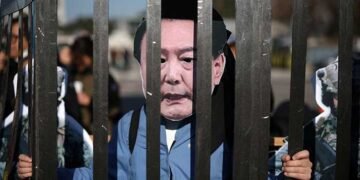UNITED NATIONS, (Hayat News): The United Nations High Commissioner for Refugees (UNHCR) has unveiled a $10 billion appeal to address critical humanitarian needs and implement sustainable solutions for refugees, displaced persons, and stateless populations worldwide in 2025.
Announced earlier this week, the Global Appeal underscores the urgent need for action as conflict, persecution, and the worsening impacts of climate change continue to uproot millions of lives.
“We are living through an era of relentless crises,” stated UN High Commissioner for Refugees Filippo Grandi in his foreword to the appeal, highlighting the unprecedented challenges of forced displacement.
Grandi pointed to recent and ongoing crises in Sudan, Ukraine, and Lebanon, which have contributed to widespread displacement, while noting the enduring nature of refugee situations stemming from countries like Myanmar and the Democratic Republic of the Congo (DRC).
If fully funded, the appeal would provide vital support to over 139 million people across 136 countries and territories.
Focus Areas of the Appeal
The 2025 Global Appeal emphasizes three core objectives: rapid emergency response, inclusion, and sustainable long-term solutions.
- Emergency Response
UNHCR remains committed to responding swiftly to new crises, delivering life-saving aid to those forced to flee. “UNHCR is among the first responders when conflict erupts,” Grandi stated, reaffirming the agency’s frontline role. - Promoting Inclusion
Beyond immediate aid, the appeal advocates for integrating displaced people into local systems. UNHCR aims to collaborate with governments, civil society, and development agencies to provide access to education, healthcare, and employment for displaced communities. - Long-Term Solutions
The agency continues to prioritize durable solutions, including voluntary repatriation, local integration, and resettlement initiatives.
Of the targeted 139.3 million individuals, 34 million are refugees (24%), 68 million are internally displaced (48%), 12 million are returnees, and approximately 4.5 million are stateless.
Regional Breakdown of Funding Needs
UNHCR has outlined the funding requirements by region:
- Middle East and North Africa: $2.1 billion
- East and Horn of Africa and Great Lakes: $2.1 billion
- Europe: $1.2 billion
- West and Central Africa: $1.2 billion
- Asia and the Pacific: $957 million
- Americas: $815 million
- Southern Africa: $451 million
The Asia-Pacific region is expected to face heightened displacement in 2025 due to ongoing conflict, climate change, and disasters. With donor fatigue threatening to reduce support, UNHCR warns of a widening gap between needs and resources.
Commitments and Partnerships
The UN High Commissioner for Refugees plans to prioritize the implementation of commitments made at the Global Refugee Forum, including over 60 pledges to protect Afghan refugees and stateless Rohingya populations. Afghanistan remains the leading source of displaced people in the region, with over nine million affected. Neighboring Pakistan and Iran host 2.4 million and 3.9 million Afghan refugees, respectively.
Bangladesh continues to support over one million stateless Rohingya refugees who fled persecution in Myanmar, representing one of the world’s largest protracted refugee crises.
Grandi stressed the importance of partnerships and collaboration, saying, “Addressing forced displacement requires collective action. Governments, local actors, academia, and the private sector all play a vital role.”
Call for Action
The 2025 appeal builds on the progress made at the 2023 Global Refugee Forum and aims to translate global commitments into tangible outcomes through technical expertise and funding.
Grandi expressed confidence in UNHCR’s readiness to navigate an unpredictable future, emphasizing the agency’s experience and determination.
“As forced displacement reaches unprecedented levels, global solidarity is not optional – it is essential,” he urged, calling on governments, donors, and private sector partners to meet the $10 billion goal.
With crises intensifying worldwide, the appeal serves as a rallying cry for a united global response to support the millions who are displaced and the communities that host them.















